Middlefield (860) 349-8500
Wallingford (203) 294-4977
Middlefield (860) 349-8500
Wallingford (203) 294-4977
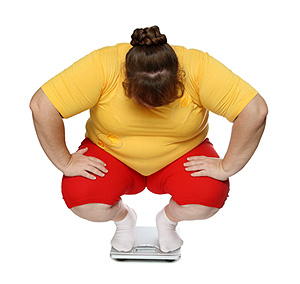 Recent research has shown a connection between foot pain and being obese. Foot ailments that may develop as a result of obesity include flat feet, arthritis, diabetes and general heel pain. Obesity may alter the general structure of the foot as a result of the heels and ankles enduring additional pressure caused by excess weight. Exercising may become difficult due to an increase in weight, and this may hinder one's ability to shed the excess pounds. Your feet will benefit if you choose to wear wide and supportive shoes, although there may be a limited selection of larger sizes necessary to accommodate them. Implementing a daily exercise routine and maintaining a healthy lifestyle may aid in combating obesity. This can typically be achieved by slowly beginning to properly stretch and exercise the feet. Please consider scheduling a consultation with a podiatrist for a recommended exercise program that may avoid foot pain.
Recent research has shown a connection between foot pain and being obese. Foot ailments that may develop as a result of obesity include flat feet, arthritis, diabetes and general heel pain. Obesity may alter the general structure of the foot as a result of the heels and ankles enduring additional pressure caused by excess weight. Exercising may become difficult due to an increase in weight, and this may hinder one's ability to shed the excess pounds. Your feet will benefit if you choose to wear wide and supportive shoes, although there may be a limited selection of larger sizes necessary to accommodate them. Implementing a daily exercise routine and maintaining a healthy lifestyle may aid in combating obesity. This can typically be achieved by slowly beginning to properly stretch and exercise the feet. Please consider scheduling a consultation with a podiatrist for a recommended exercise program that may avoid foot pain.
Obesity has become very problematic at this point in time and can have extremely negative effects on the feet. If you’re an obese individual and are concerned about your feet, contact Dr. Gordon Fosdick from Affiliated Foot Care Center. Our doctor can provide the care you need to keep you pain-free and on your feet.
Obesity and Your Feet
Since your feet are what support your entire weight when standing, any additional weight can result in pain and swelling. Being overweight is one of the main contributors to foot complications.
Problems & Complications
Extra Weight – Even putting on just a few extra pounds could create serious complications for your feet. As your weight increases, your balance and body will shift, creating new stresses on your feet. This uneven weight distribution can cause pain, even while doing the simplest tasks, such as walking.
Diabetes – People who are overweight are at serious risk of developing type-2 diabetes, which has a drastic impact on the health of your feet. As you get older, your diabetes might worsen, which could lead to loss of feeling in your feet, sores, and bruises. You could also become more prone to various infections.
Plantar fasciitis – Pressure and stress that is placed on muscles, joints, and tendons can trigger plantar fasciitis, which is an inflammation of tissue that forms along the bottom of the foot.
If you have any questions please feel free to contact our offices located in Middlefield and Wallingford, CT . We offer the newest diagnostic and treatment technologies for all your foot and ankle needs.
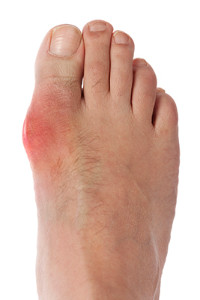 If you are experiencing severe pain in the joints surrounding the big toe, you may have a condition referred to as gout. It’s considered to be a form of arthritis, and the symptoms include redness, swelling, and extreme tenderness. Gout is the result of a buildup of excess uric acid in the body, and typically collects in the joints of the foot. These bouts of pain are typically known as gout attacks, and there may be several reasons for this to develop. The most common theory revolves around the food and drink that is consumed, which typically involves the frequent ingestion of red meat and excess alcohol. Additionally, inherited genetic traits may be a determining factor in the onset of gout. It’s important to consider scheduling a consultation with a podiatrist to learn about proper treatment options for gout.
If you are experiencing severe pain in the joints surrounding the big toe, you may have a condition referred to as gout. It’s considered to be a form of arthritis, and the symptoms include redness, swelling, and extreme tenderness. Gout is the result of a buildup of excess uric acid in the body, and typically collects in the joints of the foot. These bouts of pain are typically known as gout attacks, and there may be several reasons for this to develop. The most common theory revolves around the food and drink that is consumed, which typically involves the frequent ingestion of red meat and excess alcohol. Additionally, inherited genetic traits may be a determining factor in the onset of gout. It’s important to consider scheduling a consultation with a podiatrist to learn about proper treatment options for gout.
Gout is a painful condition that can be treated. If you are seeking treatment, contact Dr. Gordon Fosdick from Affiliated Foot Care Center. Our doctor will treat your foot and ankle needs.
What Is Gout?
Gout is a form of arthritis that is characterized by sudden, severe attacks of pain, redness, and tenderness in the joints. The condition usually affects the joint at the base of the big toe. A gout attack can occur at any random time, such as the middle of the night while you are asleep.
Symptoms
Risk Factors
Prior to visiting your podiatrist to receive treatment for gout, there are a few things you should do beforehand. If you have gout you should write down your symptoms--including when they started and how often you experience them, important medical information you may have, and any questions you may have. Writing down these three things will help your podiatrist in assessing your specific situation so that he or she may provide the best route of treatment for you.
If you have any questions, please feel free to contact our offices located in Middlefield and Wallingford, CT . We offer the newest diagnostic and treatment technologies for all your foot care needs.
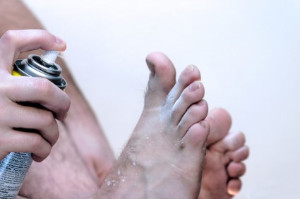 A fungal infection is the cause of a condition referred to as athlete’s foot. It survives in areas that are warm and moist, and this is one of the reasons why the feet are typically affected. Research has suggested that shoes and socks worn should consist of a breathable material, which may stop the fungi from flourishing. It’s considered to be a contagious condition and can be picked up in public showers and around pool areas. At this point, the fungus typically enters the body through any blisters or cuts that are found on the feet. A common symptom of this ailment may include an itchy feeling, which can occur between the toes and on the top of the foot. There are several ways to prevent this fungus from infecting your feet, including washing and drying the feet completely and wearing appropriate shoes while in a public shower and any surrounding areas. If you are afflicted by this condition, please consider scheduling a consultation with a podiatrist.
A fungal infection is the cause of a condition referred to as athlete’s foot. It survives in areas that are warm and moist, and this is one of the reasons why the feet are typically affected. Research has suggested that shoes and socks worn should consist of a breathable material, which may stop the fungi from flourishing. It’s considered to be a contagious condition and can be picked up in public showers and around pool areas. At this point, the fungus typically enters the body through any blisters or cuts that are found on the feet. A common symptom of this ailment may include an itchy feeling, which can occur between the toes and on the top of the foot. There are several ways to prevent this fungus from infecting your feet, including washing and drying the feet completely and wearing appropriate shoes while in a public shower and any surrounding areas. If you are afflicted by this condition, please consider scheduling a consultation with a podiatrist.
Athlete’s foot is an inconvenient condition that can be easily reduced with the proper treatment. If you have any concerns about your feet and ankles, contact Dr. Gordon Fosdick from Affiliated Foot Care Center. Our doctor will treat your foot and ankle needs.
Athlete’s Foot: The Sole Story
Athlete's foot, also known as tinea pedis, can be an extremely contagious foot infection. It is commonly contracted in public changing areas and bathrooms, dormitory style living quarters, around locker rooms and public swimming pools, or anywhere your feet often come into contact with other people.
Solutions to Combat Athlete’s Foot
Athlete’s foot can cause many irritating symptoms such as dry and flaking skin, itching, and redness. Some more severe symptoms can include bleeding and cracked skin, intense itching and burning, and even pain when walking. In the worst cases, Athlete’s foot can cause blistering as well. Speak to your podiatrist for a better understanding of the different causes of Athlete’s foot, as well as help in determining which treatment options are best for you.
If you have any questions please feel free to contact our offices located in Middlefield and Wallingford, CT . We offer the newest diagnostic and treatment technologies for all your foot and ankle needs.
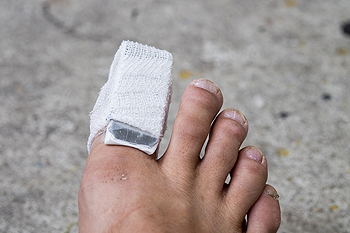 If you have fallen and have experienced severe pain at the top of the foot, you may have what is referred to as a broken toe. Additionally, this may occur if a heavy object has fallen on the toe and will often appear bruised and swollen. Fractures that are severe may cause the toe to become displaced, causing the toe to look deformed. It’s important to begin treatment of this condition as quickly as possible, often beginning with taking weight off the toe. At this point, the toe can be splinted to the toe next to it, which will restrict any movement from occurring. To properly diagnose this ailment, an X-ray may be performed to observe the severity of the fracture. If the big toe is broken, a walking boot may be suggested to be worn, typically for 2-4 weeks. If you feel you have broken your toe, please consider scheduling a consultation with a podiatrist for a proper evaluation.
If you have fallen and have experienced severe pain at the top of the foot, you may have what is referred to as a broken toe. Additionally, this may occur if a heavy object has fallen on the toe and will often appear bruised and swollen. Fractures that are severe may cause the toe to become displaced, causing the toe to look deformed. It’s important to begin treatment of this condition as quickly as possible, often beginning with taking weight off the toe. At this point, the toe can be splinted to the toe next to it, which will restrict any movement from occurring. To properly diagnose this ailment, an X-ray may be performed to observe the severity of the fracture. If the big toe is broken, a walking boot may be suggested to be worn, typically for 2-4 weeks. If you feel you have broken your toe, please consider scheduling a consultation with a podiatrist for a proper evaluation.
A broken toe can be very painful and lead to complications if not properly fixed. If you have any concerns about your feet, contact Dr. Gordon Fosdick from Affiliated Foot Care Center. Our doctor will treat your foot and ankle needs.
What to Know About a Broken Toe
Although most people try to avoid foot trauma such as banging, stubbing, or dropping heavy objects on their feet, the unfortunate fact is that it is a common occurrence. Given the fact that toes are positioned in front of the feet, they typically sustain the brunt of such trauma. When trauma occurs to a toe, the result can be a painful break (fracture).
Symptoms of a Broken Toe
Generally, it is best to stay off of the injured toe with the affected foot elevated.
Severe toe fractures may be treated with a splint, cast, and in some cases, minor surgery. Due to its position and the pressure it endures with daily activity, future complications can occur if the big toe is not properly treated.
If you have any questions please feel free to contact our offices located in Middlefield and Wallingford, CT . We offer the newest diagnostic and treatment technologies for all your foot and ankle needs.
 If you have severe pain in the back of your heel, you may have an Achilles tendon injury. It is the body’s thickest tendon, and it connects the back of the heel to the calf muscles. When the foot pushes forward while running, the Achilles tendon absorbs the force necessary for this to be accomplished. The beginning of an injury is typically represented by a dull ache in the back of the heel, and the pain will increase in severity if the running activity continues. There may be several causes for this type of injury to occur, including a poor range of motion in the ankle, calf muscles that are weakened, and having flat feet. Specific exercises that are practiced may aid in the healing of an Achilles tendon injury, and it’s recommended to see a podiatrist for a proper examination.
If you have severe pain in the back of your heel, you may have an Achilles tendon injury. It is the body’s thickest tendon, and it connects the back of the heel to the calf muscles. When the foot pushes forward while running, the Achilles tendon absorbs the force necessary for this to be accomplished. The beginning of an injury is typically represented by a dull ache in the back of the heel, and the pain will increase in severity if the running activity continues. There may be several causes for this type of injury to occur, including a poor range of motion in the ankle, calf muscles that are weakened, and having flat feet. Specific exercises that are practiced may aid in the healing of an Achilles tendon injury, and it’s recommended to see a podiatrist for a proper examination.
Achilles tendon injuries need immediate attention to avoid future complications. If you have any concerns, contact Dr. Gordon Fosdick of Affiliated Foot Care Center. Our doctor can provide the care you need to keep you pain-free and on your feet.
What Is the Achilles Tendon?
The Achilles tendon is a tendon that connects the lower leg muscles and calf to the heel of the foot. It is the strongest tendon in the human body and is essential for making movement possible. Because this tendon is such an integral part of the body, any injuries to it can create immense difficulties and should immediately be presented to a doctor.
What Are the Symptoms of an Achilles Tendon Injury?
There are various types of injuries that can affect the Achilles tendon. The two most common injuries are Achilles tendinitis and ruptures of the tendon.
Achilles Tendinitis Symptoms
Rupture Symptoms
Treatment and Prevention
Achilles tendon injuries are diagnosed by a thorough physical evaluation, which can include an MRI. Treatment involves rest, physical therapy, and in some cases, surgery. However, various preventative measures can be taken to avoid these injuries, such as:
If you have any questions please feel free to contact our offices located in Middlefield and Wallingford, CT . We offer the newest diagnostic tools and technology to treat your foot and ankle needs.
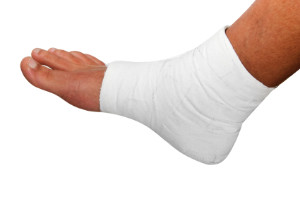 If you have endured a fall or have experienced an intense injury to the ankle, you may have sustained a broken ankle. Symptoms of a broken ankle typically include severe pain around the ankle and surrounding areas that is accompanied by visible bruising and swelling. Is important to obtain immediate medical attention if you have what appears to be a broken ankle, as this may avoid the possibility of nerve and artery damage. A diagnosis typically includes having an X-ray performed, followed by an MRI, indicating a more detailed view of the ankle for more severe fractures. It may be suggested to wear a cast or a boot, which promotes stability in the ankle, and this may take 6-8 weeks to properly heal. During this time, crutches are generally used to prevent the ankle from incurring any weight. After the healing is completed, exercises may be necessary in recovering foot and ankle flexibility.
If you have endured a fall or have experienced an intense injury to the ankle, you may have sustained a broken ankle. Symptoms of a broken ankle typically include severe pain around the ankle and surrounding areas that is accompanied by visible bruising and swelling. Is important to obtain immediate medical attention if you have what appears to be a broken ankle, as this may avoid the possibility of nerve and artery damage. A diagnosis typically includes having an X-ray performed, followed by an MRI, indicating a more detailed view of the ankle for more severe fractures. It may be suggested to wear a cast or a boot, which promotes stability in the ankle, and this may take 6-8 weeks to properly heal. During this time, crutches are generally used to prevent the ankle from incurring any weight. After the healing is completed, exercises may be necessary in recovering foot and ankle flexibility.
Broken ankles need immediate treatment. If you are seeking treatment, contact Dr. Gordon Fosdick from Affiliated Foot Care Center. Our doctor can provide the care you need to keep you pain-free and on your feet.
Broken Ankles
A broken ankle is experienced when a person fractures their tibia or fibula in the lower leg and ankle area. Both of these bones are attached at the bottom of the leg and combine to form what we know to be our ankle.
When a physician is referring to a break of the ankle, he or she is usually referring to a break in the area where the tibia and fibula are joined to create our ankle joint. Ankles are more prone to fractures because the ankle is an area that suffers a lot of pressure and stress. There are some obvious signs when a person experiences a fractured ankle, and the following symptoms may be present.
Symptoms of a Fractured Ankle
If you suspect an ankle fracture, it is recommended to seek treatment as soon as possible. The sooner you have your podiatrist diagnose the fracture, the quicker you’ll be on the way towards recovery.
If you have any questions, please feel free to contact our offices located in Middlefield and Wallingford, CT . We offer the newest diagnostic and treatment technologies for all your foot care needs.
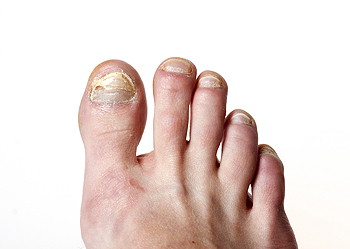 There are several early signs that can indicate you may have toenail fungus. Such indicators may include the nails becoming thick and yellowed, and may crumble when touched. An infection is likely to develop if the nail is left untreated, allowing the fungus to grow. The aging process may be a factor in developing this ailment, in addition to having poor blood circulation. Medical conditions such as eczema, psoriasis, or athlete’s foot allow easier access for the fungus to enter the body through the tiny openings in the skin these conditions may cause. Toenail fungus lives in moist environments, and socks and shoes that are worn without proper ventilation make it ideal for this fungus to grow. There are several ways to prevent this condition from developing, and these may include trimming the nails straight across, wearing appropriate shoes in public showers or pools, and utilizing a moisturizer to prevent cracked skin. A consultation with a podiatrist is suggested for a complete diagnosis and possible treatment options that are right for you.
There are several early signs that can indicate you may have toenail fungus. Such indicators may include the nails becoming thick and yellowed, and may crumble when touched. An infection is likely to develop if the nail is left untreated, allowing the fungus to grow. The aging process may be a factor in developing this ailment, in addition to having poor blood circulation. Medical conditions such as eczema, psoriasis, or athlete’s foot allow easier access for the fungus to enter the body through the tiny openings in the skin these conditions may cause. Toenail fungus lives in moist environments, and socks and shoes that are worn without proper ventilation make it ideal for this fungus to grow. There are several ways to prevent this condition from developing, and these may include trimming the nails straight across, wearing appropriate shoes in public showers or pools, and utilizing a moisturizer to prevent cracked skin. A consultation with a podiatrist is suggested for a complete diagnosis and possible treatment options that are right for you.
For more information about treatment, contact Dr. Gordon Fosdick of Affiliated Foot Care Center. Our doctor can provide the care you need to keep you pain-free and on your feet.
Toenail Fungus Treatment
Toenail fungus is a condition that affects many people and can be especially hard to get rid of. Fortunately, there are several methods to go about treating and avoiding it.
Antifungals & Deterrence
Oral antifungal medicine has been shown to be effective in many cases. It is important to consult with a podiatrist to determine the proper regiment for you, or potentially explore other options.
Applying foot powder on the feet and shoes helps keep the feet free of moisture and sweat.
Sandals or open toed shoes – Wearing these will allow air movement and help keep feet dry. They also expose your feet to light, which fungus cannot tolerate. Socks with moisture wicking material also help as well.
If you have any questions please feel free to contact our offices located in Middlefield and Wallingford, CT . We offer the newest diagnostic tools and technology to treat your foot and ankle needs.
 Maintaining proper foot care is essential at any age, and it’s especially important for the elderly population to pay close attention to their feet. Commonly, assistance is often needed to properly trim the toenails because of eyesight concerns or experiencing difficulty in bending down. There are several steps to correctly trimming the toenails, and it’s suggested to start by soaking the feet in a warm bath to aid in softening the nails. It’s wise to thoroughly dry the feet, especially between the toes, and apply a moisturizer that will prevent the skin from cracking. Trimming the toenails straight across the nail bed can prevent ingrown toenails and infections from developing. Please schedule a consultation with a podiatrist for additional information on how to care for elderly feet.
Maintaining proper foot care is essential at any age, and it’s especially important for the elderly population to pay close attention to their feet. Commonly, assistance is often needed to properly trim the toenails because of eyesight concerns or experiencing difficulty in bending down. There are several steps to correctly trimming the toenails, and it’s suggested to start by soaking the feet in a warm bath to aid in softening the nails. It’s wise to thoroughly dry the feet, especially between the toes, and apply a moisturizer that will prevent the skin from cracking. Trimming the toenails straight across the nail bed can prevent ingrown toenails and infections from developing. Please schedule a consultation with a podiatrist for additional information on how to care for elderly feet.
Proper foot care is something many older adults forget to consider. If you have any concerns about your feet and ankles, contact Dr. Gordon Fosdick from Affiliated Foot Care Center. Our doctor can provide the care you need to keep you pain-free and on your feet.
The Elderly and Their Feet
As we age we start to notice many changes in our body, but the elder population may not notice them right away. Medical conditions may prevent the elderly to take notice of their foot health right away. Poor vision is a lead contributor to not taking action for the elderly.
Common Conditions
Susceptible Infections
Diabetes and poor circulation can cause general loss of sensitivity over the years, turning a simple cut into a serious issue.
If you have any questions please feel free to contact our offices located in Middlefield and Wallingford, CT . We offer the newest diagnostic and treatment technologies for all your foot and ankle needs.
 If you feel severe pain in your toe and it looks swollen and red, you may have a condition referred to as gout. This ailment is triggered by a buildup of uric acid in the blood, causing small crystals to form and lodge in the joints of the big toe. This tends to result in inflammation, and it can cause severe pain. The symptoms may be erratic and can last for a few days before disappearing for long periods of time. Recent research suggests that causes of this condition may include a diet consisting of excess red meat, shellfish, and large amounts of alcohol, in addition to experiencing poor kidney function. Contributing factors for this ailment may include having high blood pressure and being overweight. If you experience a gout attack, please schedule a consultation with a podiatrist for additional information and correct treatment options.
If you feel severe pain in your toe and it looks swollen and red, you may have a condition referred to as gout. This ailment is triggered by a buildup of uric acid in the blood, causing small crystals to form and lodge in the joints of the big toe. This tends to result in inflammation, and it can cause severe pain. The symptoms may be erratic and can last for a few days before disappearing for long periods of time. Recent research suggests that causes of this condition may include a diet consisting of excess red meat, shellfish, and large amounts of alcohol, in addition to experiencing poor kidney function. Contributing factors for this ailment may include having high blood pressure and being overweight. If you experience a gout attack, please schedule a consultation with a podiatrist for additional information and correct treatment options.
Gout is a foot condition that requires certain treatment and care. If you are seeking treatment, contact Dr. Gordon Fosdick from Affiliated Foot Care Center. Our doctor will treat your foot and ankle needs.
What Is Gout?
Gout is a type of arthritis caused by a buildup of uric acid in the bloodstream. It often develops in the foot, especially the big toe area, although it can manifest in other parts of the body as well. Gout can make walking and standing very painful and is especially common in diabetics and the obese.
People typically get gout because of a poor diet. Genetic predisposition is also a factor. The children of parents who have had gout frequently have a chance of developing it themselves.
Gout can easily be identified by redness and inflammation of the big toe and the surrounding areas of the foot. Other symptoms include extreme fatigue, joint pain, and running high fevers. Sometimes corticosteroid drugs can be prescribed to treat gout, but the best way to combat this disease is to get more exercise and eat a better diet.
If you have any questions please feel free to contact our offices located in Middlefield and Wallingford, CT . We offer the newest diagnostic and treatment technologies for all your foot and ankle needs.
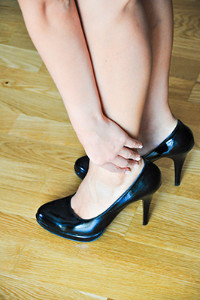 If you choose to wear high heels frequently, you may experience pain that’s common among those selecting to wear this type of shoe. Typically, when high heels are worn, the ankles bend forward, often affecting the circulation in the feet. Most runners are aware of how the arches are affected from wearing high heels and may experience aches and pains in the calves. There are several options available that may help the feet feel their best while running, one of which is limiting the time high heels are worn. It’s important to rest your feet between runs, and this is often accomplished by wearing supportive shoes. Performing proper exercises that stretch and strengthen the feet is beneficial in keeping the feet healthy and may allow the sport of running to be enjoyed to its full potential.
If you choose to wear high heels frequently, you may experience pain that’s common among those selecting to wear this type of shoe. Typically, when high heels are worn, the ankles bend forward, often affecting the circulation in the feet. Most runners are aware of how the arches are affected from wearing high heels and may experience aches and pains in the calves. There are several options available that may help the feet feel their best while running, one of which is limiting the time high heels are worn. It’s important to rest your feet between runs, and this is often accomplished by wearing supportive shoes. Performing proper exercises that stretch and strengthen the feet is beneficial in keeping the feet healthy and may allow the sport of running to be enjoyed to its full potential.
High heels have a history of causing foot and ankle problems. If you have any concerns about your feet or ankles, contact Dr. Gordon Fosdick from Affiliated Foot Care Center. Our doctor can provide the care you need to keep you pain-free and on your feet.
Effects of High Heels on the Feet
High heels are popular shoes among women because of their many styles and societal appeal. Despite this, high heels can still cause many health problems if worn too frequently.
Which Parts of My Body Will Be Affected by High Heels?
What Kinds of Foot Problems Can Develop from Wearing High Heels?
How Can I Still Wear High Heels and Maintain Foot Health?
If you want to wear high heeled shoes, make sure that you are not wearing them every day, as this will help prevent long term physical problems. Try wearing thicker heels as opposed to stilettos to distribute weight more evenly across the feet. Always make sure you are wearing the proper shoes for the right occasion, such as sneakers for exercising. If you walk to work, try carrying your heels with you and changing into them once you arrive at work. Adding inserts to your heels can help cushion your feet and absorb shock. Full foot inserts or metatarsal pads are available.
If you have any questions please feel free to contact our offices located in Middlefield and Wallingford, CT . We offer the newest diagnostic and treatment technologies for all your foot and ankle needs.